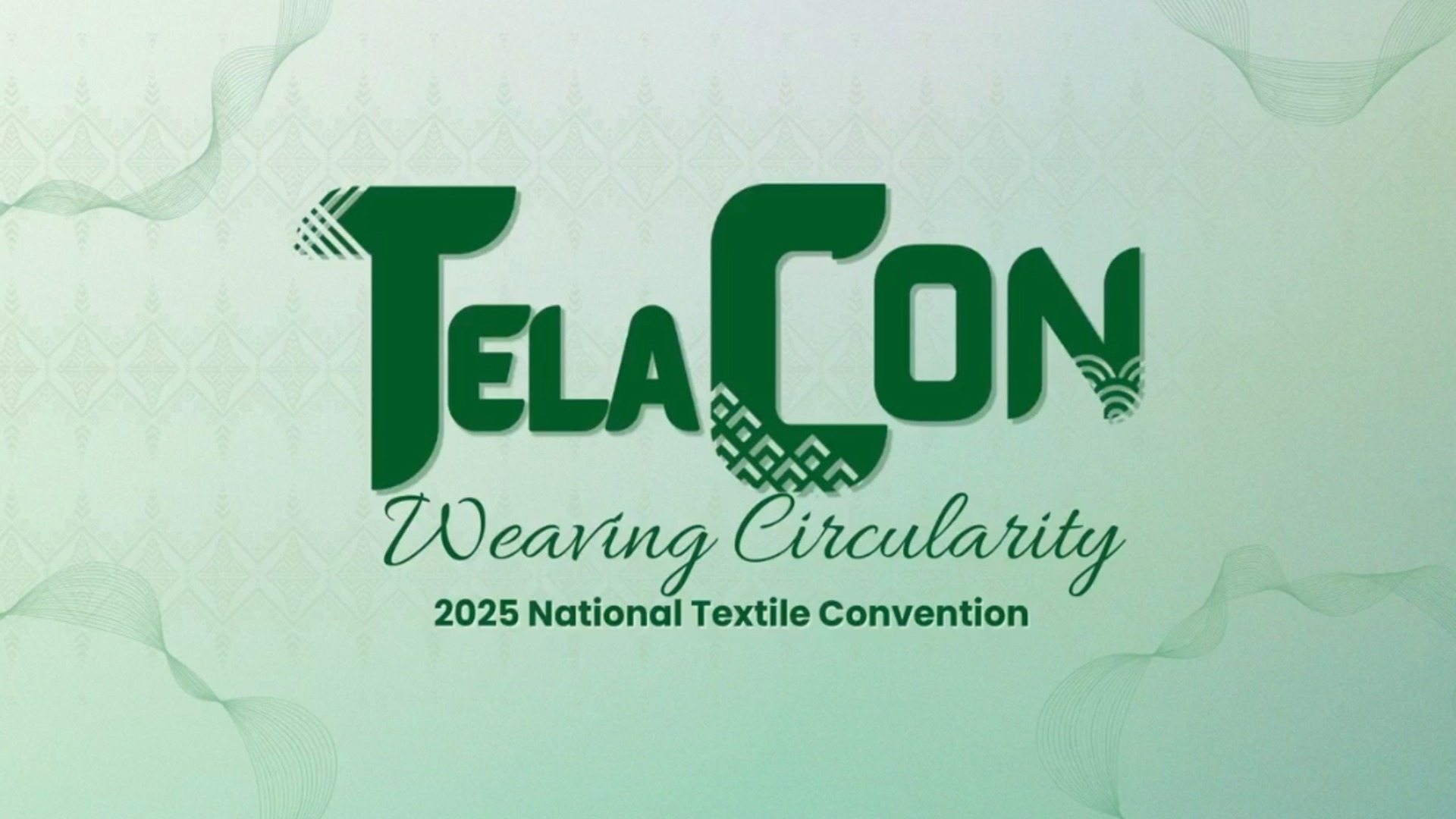The Department of Science and Technology-Philippine Textile Research Institute (DOST-PTRI) is leading the charge toward a sustainable and innovative future in the textile and garment industries with the 2025 National Textile Convention, also known as TELACon on January 30-31, 2025 at the Philippine International Convention Center (PICC) in Pasay City. The event celebrates Philippine Tropical Fabrics (PTF) Month and highlights the role of circular design principles in creating a sustainable textile industry.
With the theme “Weaving Circularity,” TELACon 2025 brings together innovators, designers, manufacturers, environmental advocates, and policymakers to explore circularity in textile production. The event promotes sustainable practices that minimize waste, reuse materials, and reduce environmental impact. TELACon aims to accelerate the transition of the Philippine textile industry towards a self-reliant, regenerative model. The convention aligns with Proclamation No. 313, which declares January as Philippine Tropical Fabrics Month, furthering the growth of the local textile sector through innovation and sustainability.
This year’s event builds on the success of previous conventions—“Pushing Boundaries” in 2023 and “Spinning Innovations” in 2024—underscoring the integration of science, technology, and sustainability. It fosters collaboration among various sectors and advocates for a shift from a linear to a circular economy, while advancing the textile industry’s role in global sustainability efforts.
Dr. Julius L. Leaño, Jr., Director of DOST-PTRI, emphasized the importance of circularity: “This year’s TELACon highlights our commitment to sustainability in the textile sector. By weaving circularity into every aspect of textile production and embracing innovative business models, we aim to create a more responsible and sustainable future. This event is an opportunity for the Philippines to lead in circular design and continue its role as a global leader in textile practices.”
Circularity in Textile Production
The first day of TELACon focused on establishing a whole-of-value-chain circularity framework for the Philippine textile ecosystem. A key session, SusTELAbility: Fostering a Circular Economy, promoted closed-loop systems, upcycling, and life-cycle analysis (LCA) to assess the environmental and socio-economic impacts of textiles.
A keynote session, Science, Technology, and Innovation as Drivers to Textile Circular Economy, underscored the role of technological advancements in driving sustainability. It explored challenges such as waste reduction and resource efficiency, with practical case studies on how innovation can foster a circular textile economy. Research on Life Cycle Assessment (LCA) for cotton yarns and silk was presented, comparing their environmental footprints to guide more sustainable production practices.
The Circular Economy Forum featured two expert sessions. The first focused on governance and national policy frameworks, with insights from organizations like the United Nations Development Programme, NEDA, and the Department of Finance. Speakers explored how their agencies support the transition to a circular economy and integrate circular economy principles into national policy. The second session discussed circular business models in the textile sector, with industry leaders from Bayo, Basically Borrowed, and other brands sharing strategies for decoupling from environmental degradation while improving human well-being, emphasizing sustainable product development and business practices.
Partnerships and Program Launches for Philippine Textiles
The second day of TELACon introduced exciting developments in the textile industry, featuring several strategic partnerships and program launches. Dr. Leaño stated: “Through partnerships with key organizations and government agencies, we aim to showcase how Philippine textiles can meet modern demands. This is not just about sustainability; it’s about national pride, economic growth, and elevating the global perception of Filipino craftsmanship.”
A major highlight was the partnership with Cebu Pacific Air, which is set to promote Philippine textiles and destinations. This collaboration will showcase local weaves through the airline’s platform, highlighting Filipino craftsmanship and cultural pride while fostering technical cooperation.
Several key initiatives were launched, including the Halal Textile Science and Technology Program, which aims to develop textiles that meet Halal standards for both local and international markets. In partnership with Timpuyog Dagiti Mannalon Ti Casilagan and the Health, Education, Environment, and Discipleship Foundation, DOST-PTRI will strengthen the Bamboo Textile Fiber Innovation Hub, fostering innovation in the bamboo textile industry. Additionally, DOST-PTRI will collaborate with UP-Diliman to advance bamboo textile research.
DOST-PTRI is also working with Creative Definitions to test and refine alternative leather materials made from natural fibers like pineapple, promoting sustainable textile solutions. HeArteFino and DOST-PTRI are collaborating to empower local artisans, focusing on product development using Philippine Tropical Fabrics (PTFs) such as poly/piña and bamboo fabrics, as well as nonwoven materials like leatherlike nonwovens. This partnership will help showcase innovative products locally and internationally.
The Philippine Tropical Fabrics Technical Committee panel discussed key accomplishments and future plans for the industry. The Legislative Framework and Policies in Support of Philippine Textiles forum examined how government policies can facilitate the promotion and use of Philippine Tropical Fabrics (PTF). The Challenges and Opportunities of PTF for Government Uniforms session looked at how PTF can be incorporated into mainstream apparel, including uniforms for government workers. A session on Philippine Textile in Our Self-Reliance Defense Posture highlighted the role of military textiles in protecting personnel, focusing on how science, engineering, and innovation enhance military textile capabilities to support defense initiatives.
The event culminated in the KatHABI Fashion Innovation Show, which featured government-appropriate uniforms made from Philippine Tropical Fabrics. The show underscored how local textiles can meet modern functional and aesthetic needs, aligning with RA 9242, which mandates the use of these fabrics in government uniforms.
TELACon 2025 marks a significant step in the Philippines’ push toward a circular textile economy, offering a platform for innovation, collaboration, and sustainable practices. As the textile industry embraces circularity, TELACon will continue to foster a vibrant and responsible future for Philippine textiles.
For more information about TELACon 2025, visit https://www.ptri.dost.gov.ph and https://www.facebook.com/ptri.dost.



